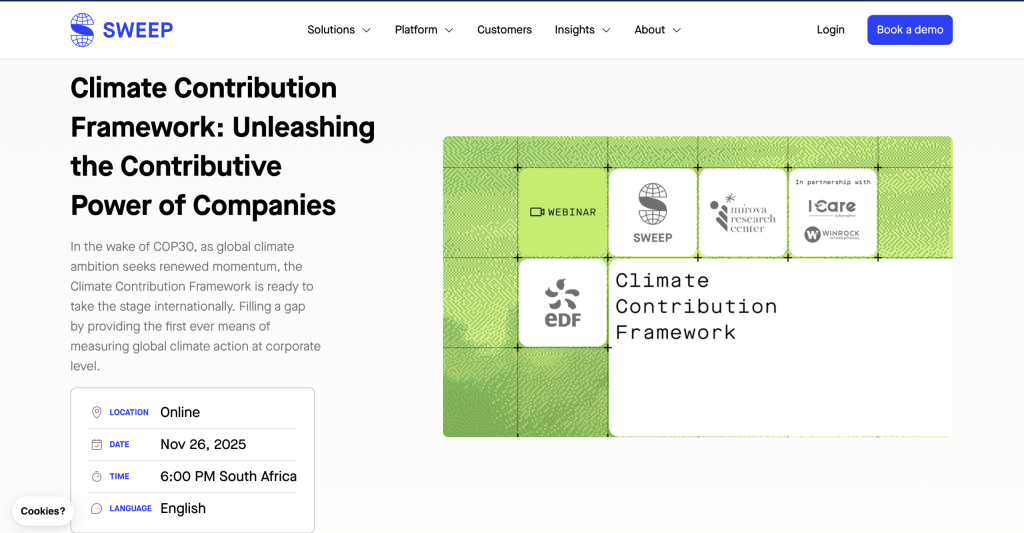New Climate Contribution Framework (CCF) introduces a unified, science-based benchmark to measure the full spectrum of corporate climate contributions.
Developed with I Care by BearingPoint and Winrock International, the framework evaluates reductions, solutions, and climate finance—weighted by sector relevance and impact potential.
Backed by major global companies and an expert observer committee, the CCF acts as a meta-framework compatible with existing standards and transition plans.
A New Benchmark for Corporate Climate Action
In the wake of COP30, Mirova Research Center and Sweep have launched the Climate Contribution Framework (CCF), a pioneering methodology designed to fairly measure and value corporate contributions to global net zero. Developed by I Care by BearingPoint and Winrock International, the CCF replaces the narrow focus on emissions reduction with a broader, science-based assessment of corporate climate impact.
The framework introduces a universal indicator that evaluates both the actual and potential contribution of companies to global carbon neutrality. It captures innovation, finance, policy influence, and climate-enabling activities—areas that traditional carbon accounting often overlooks.
How the Framework Works
Built around three core, sector-adjusted levers, the CCF creates a fair and comparable view of climate performance across industries:
Carbon footprint reduction: progress across scopes 1, 2, and 3.
Climate solutions: products and services that enable avoided or removed emissions beyond a company’s own footprint.
Climate finance: capital mobilized toward breakthrough technologies and nature-based solutions.
Each lever is weighted according to sectoral relevance and global impact potential, ensuring that companies are evaluated within the context of their role in the economy.
A Tool for Leaders Across the Climate Ecosystem
The CCF is designed to serve companies, investors, policymakers, and civil society:
Companies gain a transparent, sector-adjusted assessment of climate leadership, strategic planning support, and recognition for their full contribution.
Investors gain a robust, comparable benchmark to identify best practices and guide capital allocation.
Policymakers gain a credible tool to inform regulation and strengthen trust in private-sector commitments.
Civil society gains clarity and legitimacy around corporate claims, reinforcing accountability.
Unlike traditional standards, the CCF acts as a meta-framework—aligning with existing norms on carbon footprints, reduction trajectories, transition plans, and offsets. This reduces reporting burden and increases coherence across fragmented climate standards.
Responding to a Post-COP30 Turning Point
Ten years after the Paris Agreement, the corporate climate landscape is at a crossroads. While emissions reduction frameworks are well established, global progress is stalling as companies face overlapping standards and a narrow focus on decarbonization. COP30 underscored the need for a new narrative—one that positions companies not only as emitters, but as essential drivers of climate solutions through innovation, financing, and influence.
The CCF responds directly to this need, offering a science-based pathway to accelerate corporate contributions and rebuild trust in net-zero commitments.
The framework’s modular architecture can also be adapted beyond climate. Its design enables future extensions to biodiversity and other sustainability priorities, supporting a transition toward integrated, nature-positive corporate strategies.
Philippe Zaouati, CEO, Mirova:
“The Climate Contribution Framework is a game-changer. It finally allows us to recognize and compare the full spectrum of corporate climate action. By moving beyond emissions alone, we empower companies and investors to accelerate the transition and channel resources where they will have the greatest impact.”
Julien Denormandie, Chief Impact Officer, Sweep:
“Too often, companies are seen simply as emitters of CO₂. The Climate Contribution Framework changes this narrative, recognizing the essential role business plays in delivering climate solutions at scale.”
Guillaume Neveux, Founder & Partner, I Care by BearingPoint:
“Assessing climate contribution requires nuance and fairness. Our methodology ensures that every company can be evaluated transparently, based on its real-world impact.”
Brad Schallert, Director of Net Zero Services, Winrock International:
“Inventory-focused frameworks miss the full picture of positive climate impact. The CCF provides a more holistic assessment, enabling nuanced comparison across companies.”
Carine de Boissezon, Chief Impact Officer, EDF:
“EDF welcomes the Climate Contribution Framework as a much-needed tool to showcase the breadth of our climate action. It helps demonstrate both our footprint reductions and our wider impact through electrification and innovation.”
A Broad Coalition Behind the Framework
Initiators: Mirova Research Center, Sweep
Methodology: I Care by BearingPoint, Winrock International
Supporters: Orange, EDF, Veolia, Eramet, Accor, Schneider Electric, Equans, Renault Group
Observer Committee: Experts from WBCSD, SBTi, SEI, ICROA, IETA, CERES, ERI, WBA, Oxford Net Zero, GHGMI, and others

